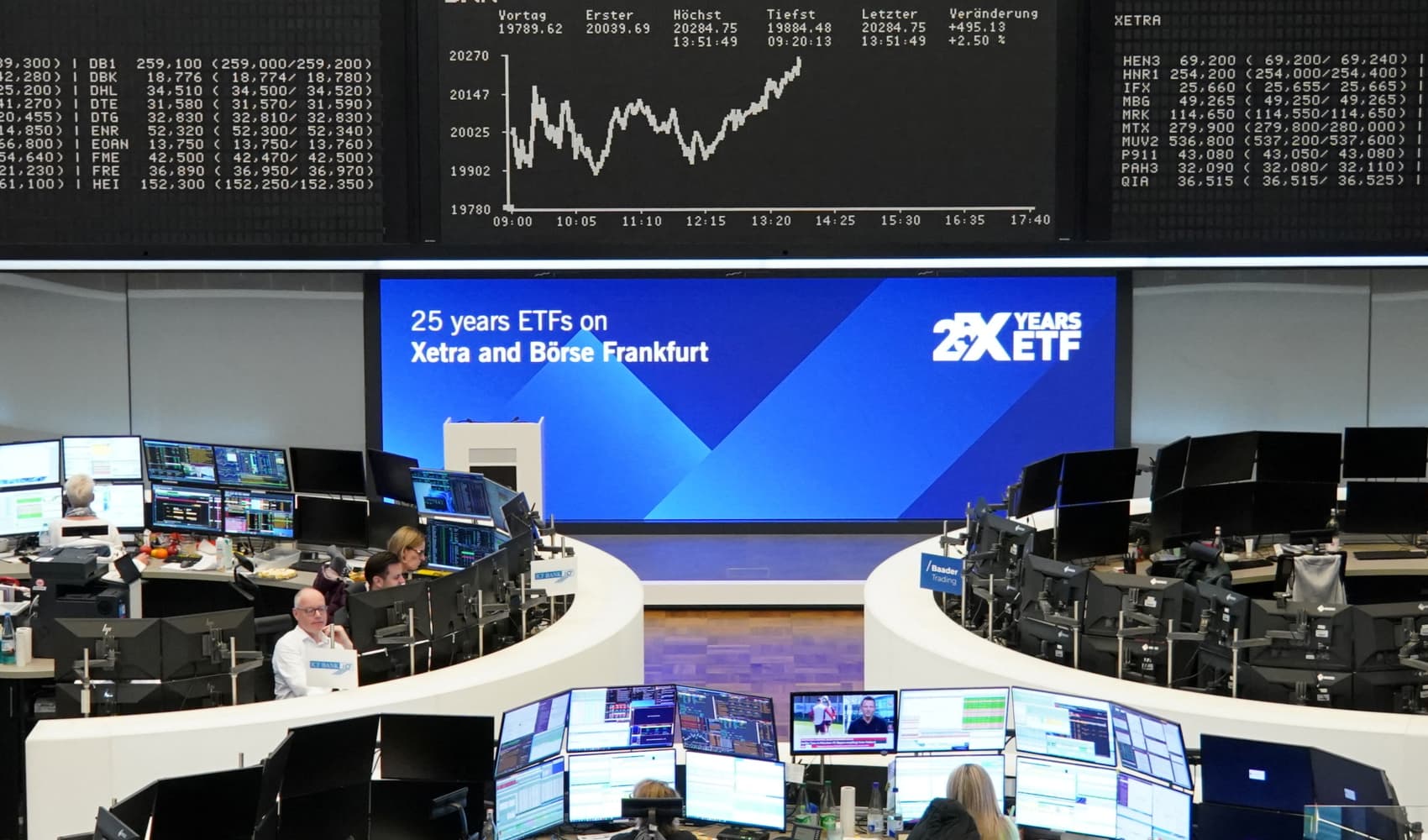ECB: Inflation Progress, Tariff Threat Looms - Expert Analysis
Inflation Victory Near? ECB Members Sound Alarm on Tariff Threats
Introduction: A Balancing Act for the European Central Bank
The European Central Bank (ECB) is walking a tightrope. After a relentless battle against soaring inflation, policymakers are finally seeing daylight. But just as victory seems within reach, a new challenge is emerging: the looming threat of tariffs. This week, CNBC spoke with several ECB members at the World Bank and International Monetary Fund (IMF) Spring Meetings, and their message was clear: inflation progress is significant, but tariff risks are a major concern. Let's dive into what these key figures had to say and what it means for the future of the Eurozone.
The Inflation Battle: Are We Winning?
Lagarde's Optimism with a Caveat
ECB President Christine Lagarde struck a cautiously optimistic tone. She stated that "the disinflationary process is so much on track that we are nearing completion." That's encouraging news, right? But Lagarde also highlighted the potential impact of tariffs, emphasizing that the ultimate effect "will depend on what countermeasures are eventually taken by Europe." So, while we're making progress, the game isn't over yet.
The Tariff Threat: A New Economic Storm?
Why Tariffs Are a Big Deal
Remember those days when the biggest economic headaches were the pandemic, snarled supply chains, and rocketing energy prices? Well, tariffs are now taking center stage. They're essentially taxes on imported goods, and they can have a ripple effect throughout the economy. Higher import costs can lead to increased prices for consumers and businesses, potentially derailing the ECB's efforts to control inflation.
The IMF's Warning Signs
The IMF set the tone for the week by releasing its latest economic forecasts, which included downward revisions for growth outlooks in the U.S., U.K., and several Asian countries. Could tariffs be a contributing factor? Absolutely. Trade wars and protectionist policies create uncertainty and disrupt global trade flows, which can stifle economic growth.
Short-Term Pain, Long-Term Gain? Knot's Perspective
Growth and Inflation Trade-Offs
Klaas Knot, president of the Netherlands Bank, offered a more nuanced view. "In the short run, we will have lower growth. We will probably also have lower inflation," he said. It seems contradictory, doesn't it? How can tariffs lead to lower inflation? Well, reduced growth means less demand, which could, in theory, put downward pressure on prices. However, this is a risky strategy, as it could also lead to a recession.
European Response: Countermeasures on the Horizon
The Importance of a Coordinated Strategy
Lagarde's comments about "countermeasures" are crucial. Europe isn't likely to sit idly by if slapped with new tariffs. But what form will these countermeasures take? A tit-for-tat tariff war could escalate quickly and inflict significant damage on all sides. A more strategic approach might involve targeted sanctions, diplomatic pressure, or even legal challenges through the World Trade Organization (WTO).
Impact on Consumers: Will Prices Go Up?
The Cost of Protectionism
Ultimately, the question on everyone's mind is: how will this affect my wallet? If tariffs increase the cost of imported goods, businesses are likely to pass those costs on to consumers. This could mean higher prices for everything from electronics and clothing to food and cars. In other words, protectionism often comes at the expense of consumers.
Impact on Businesses: Navigating Uncertainty
Supply Chain Disruptions and Investment Decisions
Businesses also face significant challenges. Tariffs can disrupt supply chains, forcing companies to find new suppliers or absorb higher costs. This creates uncertainty, which can discourage investment and hiring. Companies may delay expansion plans or even downsize if they're unsure about the future trade environment.
The Eurozone's Economic Outlook: Cloudy Skies Ahead?
Balancing Growth and Inflation
The Eurozone's economic outlook remains uncertain. While inflation is trending downward, growth is still sluggish. The potential impact of tariffs adds another layer of complexity. The ECB must carefully balance the need to support economic growth with the need to maintain price stability.
The ECB's Next Moves: Waiting and Watching
Data Dependency and Flexibility
The ECB has repeatedly emphasized its data-dependent approach to monetary policy. This means that policymakers will closely monitor economic indicators, including inflation, growth, and trade data, before making any decisions about interest rates. The ECB will also need to remain flexible and adapt its policies as the situation evolves.
Geopolitical Risks: A World of Uncertainty
Beyond Tariffs: Other Threats to the Economy
Tariffs aren't the only geopolitical risk facing the global economy. Tensions in Eastern Europe, rising nationalism, and increasing competition between major powers all contribute to uncertainty. These factors can further disrupt trade flows and investment, making it even harder for central banks to manage their economies.
The Role of International Cooperation: A Call for Diplomacy
Avoiding a Trade War
In an interconnected world, international cooperation is essential. Trade wars hurt everyone, and diplomacy is the best way to resolve trade disputes. Countries need to work together to reduce trade barriers, promote fair competition, and create a stable and predictable trading environment.
The Long-Term Implications: Reshaping the Global Economy
A Shift Towards Regionalization?
The rise of protectionism could lead to a reshaping of the global economy. Companies may increasingly focus on regional supply chains and domestic markets, rather than global trade. This could lead to a more fragmented and less efficient global economy.
Technological Disruption: A Wild Card
Automation and the Future of Work
Technological disruption is another factor that could complicate the economic outlook. Automation and artificial intelligence are rapidly changing the nature of work, and this could lead to job losses in some industries. Governments need to invest in education and training to prepare workers for the jobs of the future.
Conclusion: Navigating a Complex Landscape
The ECB faces a challenging task. While progress on inflation is encouraging, the threat of tariffs looms large. The impact of tariffs will depend on the countermeasures taken by Europe and the broader global economic environment. The ECB must remain vigilant, flexible, and data-dependent as it navigates this complex landscape. The future of the Eurozone economy hangs in the balance. Will Europe respond appropriately to the coming trade challenges? Only time will tell.
Frequently Asked Questions
- Will tariffs definitely increase prices for consumers? While tariffs often lead to higher prices, the extent of the increase depends on various factors, including the size of the tariff, the elasticity of demand for the affected goods, and the competitive landscape in the relevant industries.
- What specific "countermeasures" might Europe take in response to tariffs? Europe could implement retaliatory tariffs on goods from the countries imposing the initial tariffs, file a dispute with the World Trade Organization (WTO), or pursue diplomatic negotiations to resolve the trade dispute.
- How will tariffs affect small businesses in the Eurozone? Small businesses may find it more difficult to absorb the higher costs associated with tariffs, potentially impacting their competitiveness and profitability. They may also face challenges in navigating complex trade regulations and procedures.
- What is the ECB's role in mitigating the negative impacts of tariffs? The ECB can adjust its monetary policy to support economic growth and maintain price stability in the face of tariff-related shocks. However, monetary policy alone may not be sufficient to fully offset the negative effects of tariffs.
- Beyond tariffs, what are the other main risks to the Eurozone economy right now? Other significant risks include geopolitical tensions, supply chain disruptions, rising energy prices, and the potential for a slowdown in global economic growth. The ongoing war in Ukraine and its impact on energy security is a major concern.


